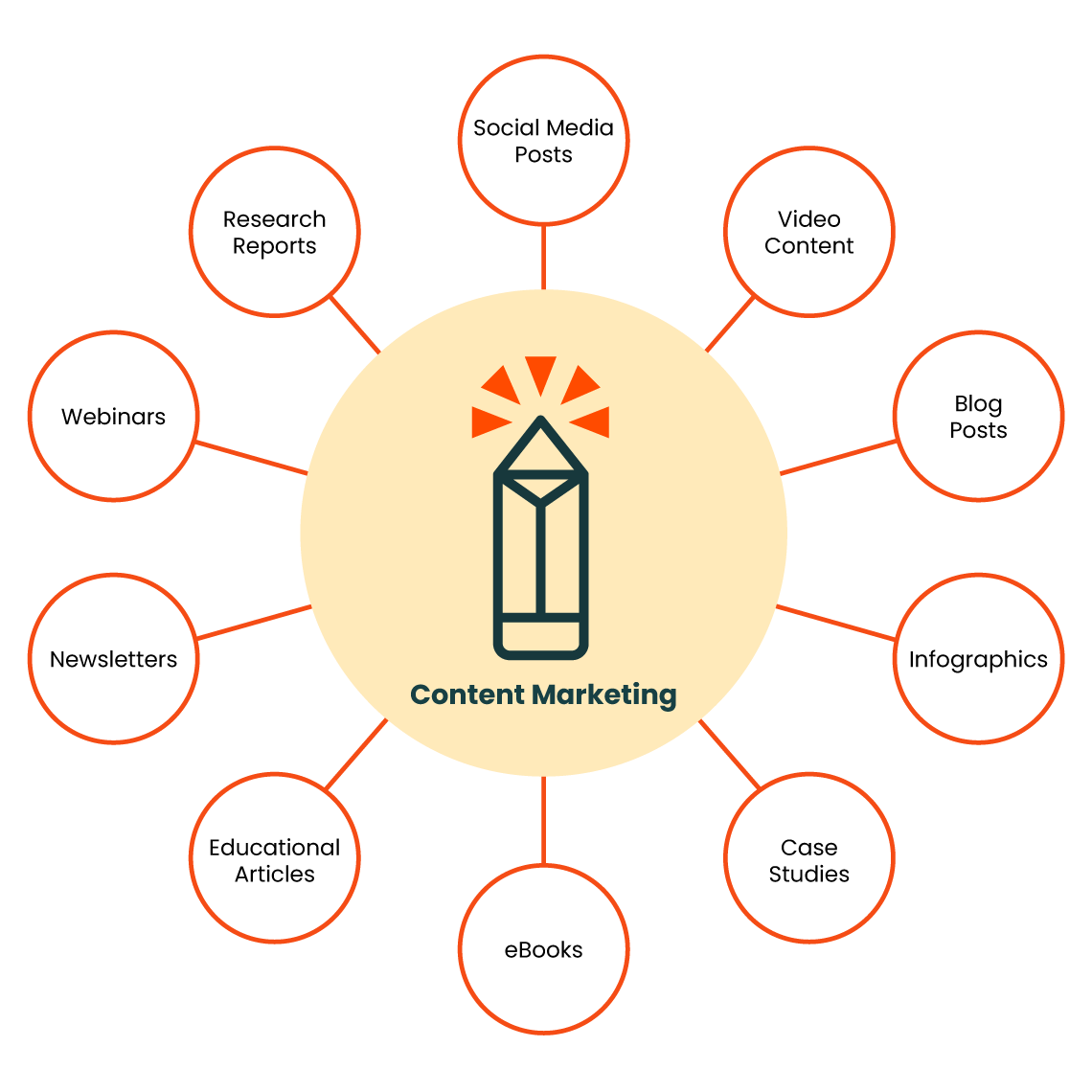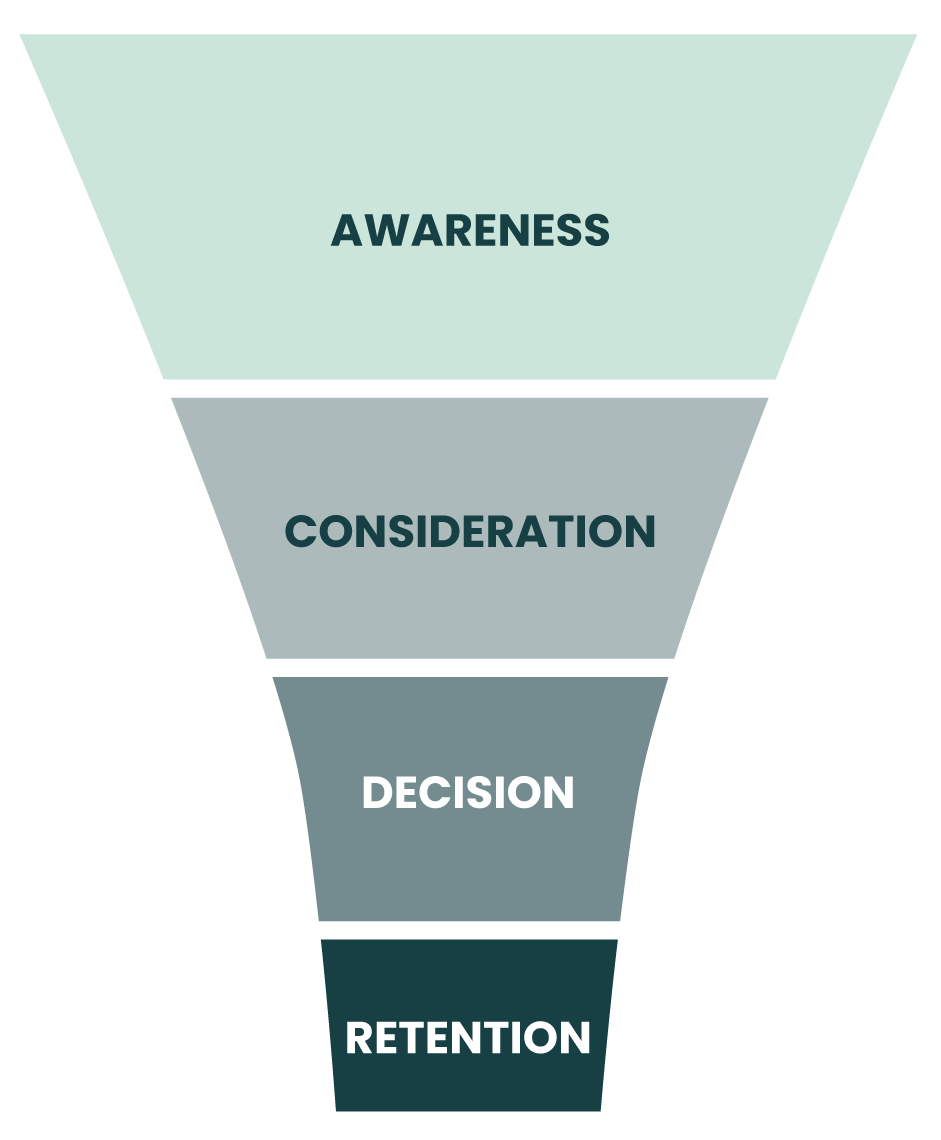The Complete Guide to Content Marketing
Content Marketing Definition:
What is Content Marketing?
Content marketing attracts and engages a clearly defined audience by consistently creating, distributing, and promoting valuable, relevant content. By aligning with the audience’s needs and interests, it seeks to build trust, authority, and long-term relationships by providing solutions, insights, and entertainment. Successful B2B content marketing turns a brand into a go-to resource in their industry and drives sustainable growth through trust and engagement. 

Why Is Content Marketing Important?
Content marketing drives organic growth, builds lasting customer relationships, and supports broader marketing goals while meeting the evolving needs of a brand’s target audience. It’s not just a tactic — it’s a long-term strategy. Content marketing is important to a brand because it:
- Builds trust and authority
Consistently providing valuable, insightful, and relevant content demonstrates your expertise in your field and sets your brand apart as a thought leader and trusted resource. Trust is critical in the decision-making process because customers are more likely to buy from brands they view as credible.
For example, a company that publishes high-quality guides and industry reports will build a reputation for being knowledgeable, helpful, and reliable, which helps build long-term relationships with its audience. This is especially critical in B2B content marketing where buyer journeys can be several months long.
- Meets target audiences where they are
Unlike advertising, content marketing isn’t based on interrupting people’s attention. Instead, it seamlessly shares relevant information on platforms they are already using — including email, social media, and search engines.
A successful content marketing strategy is tailored to the interests, challenges, and needs of your target audience. Assets like blog posts, whitepapers, and videos attract and engage prospective customers.
- Improves SEO and increases visibility
Content marketing is a critical ingredient of any successful search engine optimization (SEO) strategy because search engines prioritize content that is high-quality, informative, and relevant to users’ queries. Publishing quality content will help you rank higher in search results and drive organic traffic to your website. This is important because it reduces the reliance on paid advertising to draw visitors to your website.
- Generates and nurtures leads
Gated content resources — like ebooks, research reports, or webinars — that attract potential customers fuel lead generation because they are deemed valuable enough to capture users’ contact information.
Once leads are captured, content marketers can send them a series of additional resources to guide them through the funnel, like case studies, testimonials, and product one-pagers.
- Boosts customer retention and loyalty
Content marketing doesn’t stop after a sale. Providing continuous value through tutorials, user guides, or customer-exclusive resources helps customers maximize the benefit of your product or service. Loyal customers are more likely to become repeat buyers and advocates, further extending your brand’s reach.
- Generates results well into the future
A good content marketing strategy will combine timely and evergreen content because a well-crafted blog post or video can drive traffic and leads for months or even years after its publication. This can be significantly more cost-effective than traditional advertising, which stops delivering results once the campaign ends.
- Differentiates your brand
In crowded markets, standing out is essential. Content marketing sets your brand apart in two ways: thought leadership content that builds trust, and sales enablement content that showcases your brand’s unique value and personality. When potential customers understand that you are valuable and trustworthy, they have concrete reasons to choose you over the competition.
- Supports other marketing channels
There’s a reason why people say “Content is king” — because it is the foundation of almost every digital marketing strategy. Social media campaigns rely on shareable posts, videos, and graphics. Email newsletters need engaging content to retain subscribers. Paid ads often promote high-value content offers, like ebooks or webinars. A strong content marketing strategy either fuels or amplifies all other marketing efforts.
What Types of Content Marketing Are Used Throughout the Marketing Funnel?
Content Across the B2B Marketing Funnel

Content marketing plays a valuable role in the entire marketing funnel, and a good content marketing strategy will address different topics and use different formats at each stage. Some examples of content marketing at each stage of the funnel include:
Top of funnel (Awareness):
Top of the funnel content answers initial questions, interests, or problems. At this stage, the goal is not to sell but to educate and inform to capture attention and generate interest. Different types of content marketing include:
- Blog posts
- Articles
- Infographics
- Educational videos
- Podcasts
- Checklists
Middle of funnel (Consideration):
Middle of the funnel content is for people who are actively evaluating solutions to their problem. The goal is to build trust, educate prospects further, and demonstrate how your product or service could meet their needs, without pushing a hard sell. Different types of content marketing include:
- Case studies
- In-depth whitepapers
- Webinars
- Ebooks
- Interactive quizzes and assessments
Bottom of funnel (Decision):
Bottom of the funnel content is designed to convert leads into customers by providing content that instills confidence, eliminates doubts, and demonstrates the value of your product or service. Different types of content marketing include:
- Product demo videos
- One pagers
- ROI calculators
- Product comparisons
- Customer testimonials
How to Get Started With Content Marketing
With so many types of content marketing, getting started can feel daunting. There are three initial steps to take:
1. Define your goals: Identify what you want to achieve with content marketing. These goals should map back to driving impact for your business as a whole. Common goals include:
- Increasing brand awareness
- Generating leads
- Driving website traffic
- Building trust and authority
- Improving customer retention
2. Research your target audience: You cannot create content that addresses your target audience’s specific needs and wants without understanding who they are, what’s top of mind for them, what their challenges are, and how they like to consume content.
3. Map out your buyer journey: Once you know who your audience is, map out the buyer journey to determine which types of content marketing and topics are most appropriate. You can even create a content marketing calendar to make sure everything gets tackled.
- Awareness Stage: They realize they have a problem or need
- Consideration Stage: They are exploring solutions and evaluate options
- Decision Stage: They need to choose a specific product or service
How to Determine If Your Content Marketing Strategy Is Working
Content is the foundation of digital marketing strategies and data is the foundation for a successful content marketing strategy. A good content marketer will be just as good at engagement data analysis as content creation because the data will tell you which types of content marketing are working — and which ones aren’t.
Data provides the insights needed to make informed content marketing decisions, optimize performance, and align efforts with audience preferences. Making data analysis a key ingredient in your content marketing strategy ensures that every piece of content serves a purpose — whether it’s building awareness, nurturing leads, or driving conversions — while aligning with audience needs and business goals. By leveraging tools like Google Analytics 4 (GA4) and engagement data from your CRM, you can create a content marketing strategy driven by real-world audience behavior rather than guesswork.
For example, GA4 can reveal the most frequently accessed pages or resources and the biggest traffic sources to your website. CRM data can highlight popular email topics and lead generation magnets, identify which segments are most and least engaged, and determine which campaigns generated the biggest business impact.
Why Do Startups Turn to an Agency for Content Marketing Services?
Startups often hire an agency for content marketing services to leverage specialized expertise, save time, and achieve better results. Whether the startup is new to content marketing or looking to scale existing efforts, an agency can provide the skills, resources, and strategy needed to create impactful campaigns.
More specific benefits include:
1. Access to specialized expertise
- Experienced professionals: Providers of content marketing services are experts in writing, design, and strategy, ensuring high-quality content that resonates with your audience.
- Industry knowledge: Many agencies specialize in specific industries, offering tailored solutions based on deep market insights.
- Up-to-date best practices: Content marketing agencies stay ahead of trends, tools, and algorithm changes, ensuring your strategy remains competitive.
2. Time savings
- Focus on your core business: Having an outside team handle your content marketing services enables startups to dedicate their time to core operations while experts handle content creation and distribution.
- Faster turnaround: With established workflows and dedicated teams, content marketing agencies deliver campaigns quickly and efficiently.
3. Scalability
- Flexible solutions: Content marketing agencies can adapt to your needs, whether you require a single blog post, a multi-channel campaign, or ongoing support.
- Efficiency: Instead of hiring and training an in-house team, having an agency provide content marketing services is a scalable, on-demand alternative.
4. Cost-efficiency
- Lower overhead: Hiring an agency to provide content marketing services is often more cost-effective than building a full in-house content marketing team.
- Access to additional experts: Integrated agencies also have experts in PR, SEO, and paid advertising that can offer additional insight into your content marketing strategy.
Why Content Marketing Is Essential for Every Business
Content marketing is more than a tactic — it’s a transformative strategy that empowers businesses to connect meaningfully with their audiences, build trust, and drive sustainable growth. By creating valuable, relevant, and engaging content tailored to every stage of the marketing funnel, brands can stand out in crowded markets, nurture lasting customer relationships, and achieve measurable results.
Whether you’re a startup just getting started or an established company looking to refine your approach, a thoughtful content marketing strategy can be the cornerstone of your success. Content marketing isn’t just about what you create — it’s about the impact you make.
Startups of all sizes use Firebrand’s content marketing experts to make a bigger impact. Check out what we can do for your business.
